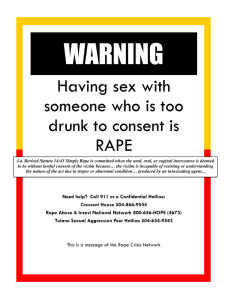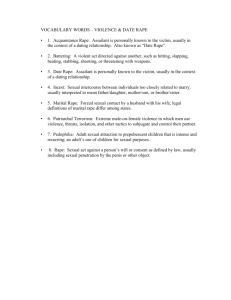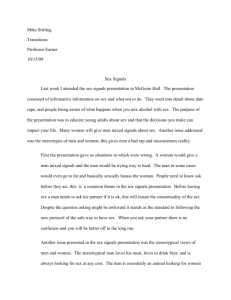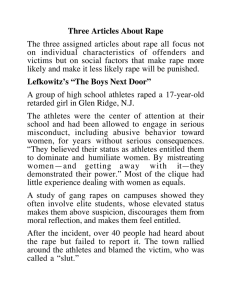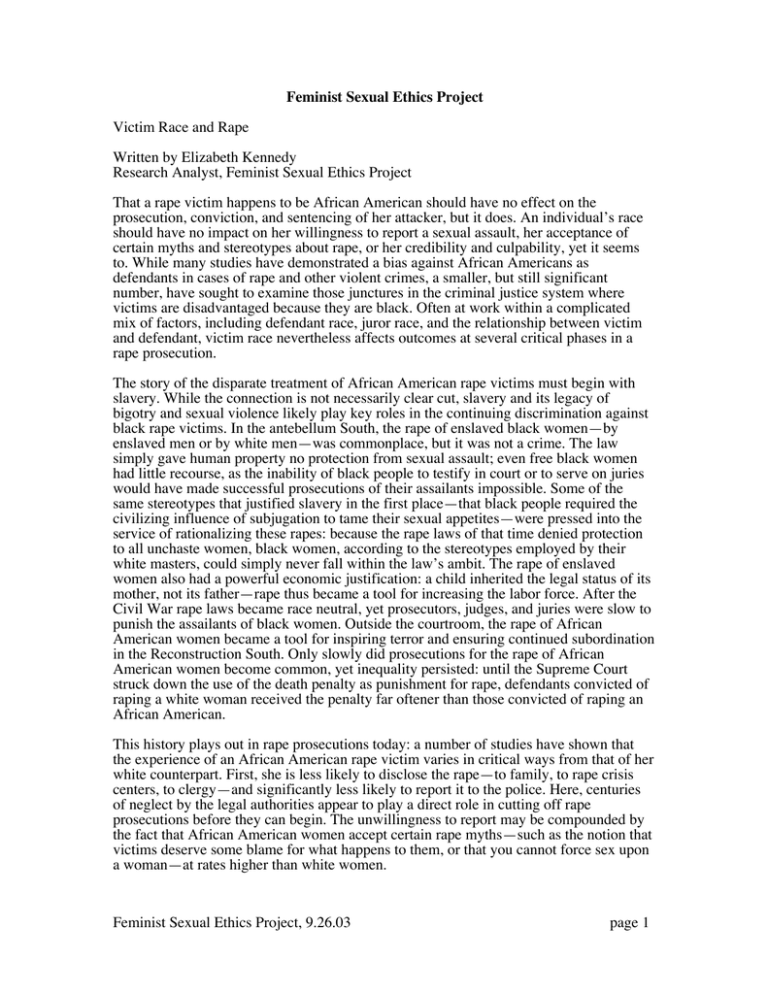
Feminist Sexual Ethics Project
Victim Race and Rape
Written by Elizabeth Kennedy
Research Analyst, Feminist Sexual Ethics Project
That a rape victim happens to be African American should have no effect on the
prosecution, conviction, and sentencing of her attacker, but it does. An individual’s race
should have no impact on her willingness to report a sexual assault, her acceptance of
certain myths and stereotypes about rape, or her credibility and culpability, yet it seems
to. While many studies have demonstrated a bias against African Americans as
defendants in cases of rape and other violent crimes, a smaller, but still significant
number, have sought to examine those junctures in the criminal justice system where
victims are disadvantaged because they are black. Often at work within a complicated
mix of factors, including defendant race, juror race, and the relationship between victim
and defendant, victim race nevertheless affects outcomes at several critical phases in a
rape prosecution.
The story of the disparate treatment of African American rape victims must begin with
slavery. While the connection is not necessarily clear cut, slavery and its legacy of
bigotry and sexual violence likely play key roles in the continuing discrimination against
black rape victims. In the antebellum South, the rape of enslaved black women—by
enslaved men or by white men—was commonplace, but it was not a crime. The law
simply gave human property no protection from sexual assault; even free black women
had little recourse, as the inability of black people to testify in court or to serve on juries
would have made successful prosecutions of their assailants impossible. Some of the
same stereotypes that justified slavery in the first place—that black people required the
civilizing influence of subjugation to tame their sexual appetites—were pressed into the
service of rationalizing these rapes: because the rape laws of that time denied protection
to all unchaste women, black women, according to the stereotypes employed by their
white masters, could simply never fall within the law’s ambit. The rape of enslaved
women also had a powerful economic justification: a child inherited the legal status of its
mother, not its father—rape thus became a tool for increasing the labor force. After the
Civil War rape laws became race neutral, yet prosecutors, judges, and juries were slow to
punish the assailants of black women. Outside the courtroom, the rape of African
American women became a tool for inspiring terror and ensuring continued subordination
in the Reconstruction South. Only slowly did prosecutions for the rape of African
American women become common, yet inequality persisted: until the Supreme Court
struck down the use of the death penalty as punishment for rape, defendants convicted of
raping a white woman received the penalty far oftener than those convicted of raping an
African American.
This history plays out in rape prosecutions today: a number of studies have shown that
the experience of an African American rape victim varies in critical ways from that of her
white counterpart. First, she is less likely to disclose the rape—to family, to rape crisis
centers, to clergy—and significantly less likely to report it to the police. Here, centuries
of neglect by the legal authorities appear to play a direct role in cutting off rape
prosecutions before they can begin. The unwillingness to report may be compounded by
the fact that African American women accept certain rape myths—such as the notion that
victims deserve some blame for what happens to them, or that you cannot force sex upon
a woman—at rates higher than white women.
Feminist Sexual Ethics Project, 9.26.03
page 1
When the African American victim does report, the prosecutor is less likely to file
charges than if a similarly situated white woman made a similar report. In cases of
stranger rape, where the perceived seriousness of the crime causes prosecutors to ignore
certain victim characteristics—such as risk taking or questionable moral character—that
in closer cases would discourage them from charging rather than risk losing the case,
victim race is still reason to pause.
When the victim does report, and the prosecutor does charge, what does the jury think of
the African American accuser? Here again, her race matters in myriad ways. One study of
mock jurors indicates that with little information about the crime, people are more likely
to believe that the assailant of a white woman is guilty than they believe in the guilt of a
black woman’s assailant, suggesting that individuals enter the jury room with significant
biases. The same study indicates that when the evidence is neutral or indeterminate (like
the evidence in most rape trials, since the close cases are those that proceed beyond plea
bargaining to trial), jurors are more likely to view that evidence as favorable to the
prosecution when the victim is white than when she is black. In terms of victim
credibility, another study of actual jurors suggests that decisionmakers are simply less
likely to believe in a defendant’s guilt when his accuser is black. Another study indicates
that “date rape” is perceived as less serious when the victim is black: mock jurors were
less likely to believe that a crime had occurred or that the assailant should be held
responsible.
When the jury does find the assailant of an African American woman guilty of rape, her
race continues to play a role in the proceedings. A study of actual trial outcomes indicates
that, in combination with defendant race, victim race affects the seriousness of the
defendant’s charge and the severity, location, and length of his sentence. Where a black
man was convicted of raping a white woman, he was more likely to be charged with a
felony, more likely to receive a jail term, more likely to serve his time in a state
penitentiary than in a local facility, and received a longer sentence on average than
defendants in cases with a different defendant-victim racial dyad.
With occasional dissent, studies that have sought to determine the impact of victim race
on rape cases have found significant effects across the spectrum of legal decisions that
occur within any prosecution, though the effects often exist in relation to other racial
factors. Most striking are the studies suggesting that African American women have
internalized historical racism, as well as rape myths, in ways that affect their status as
potential and actual victims of rape. Surprisingly, few of the authors made explicit
reference to the history of discrimination against African American women, or discussed
their results as the potential legacy of that discrimination. Yet the connection seems
inescapable, and further study could illuminate the specific ways in which slavery, the
violent aftermath of the Civil War, and persistent societal discrimination against African
Americans contribute to the range of inequalities that African American women face as
victims of rape.
http://www.brandeis.edu/projects/fse/
Feminist Sexual Ethics Project, 9.26.03
page 2

